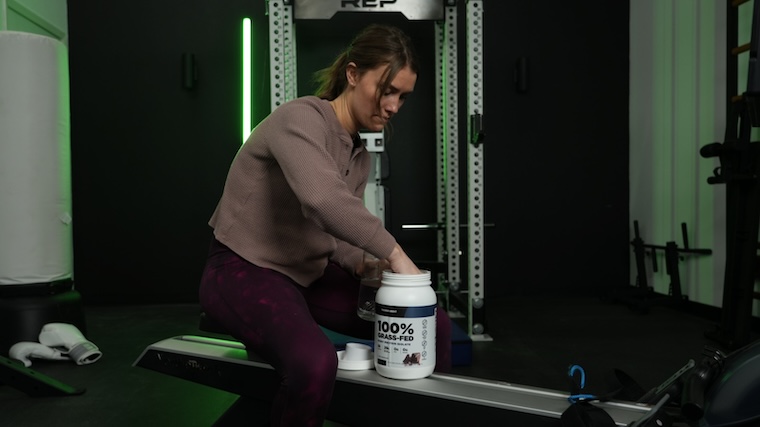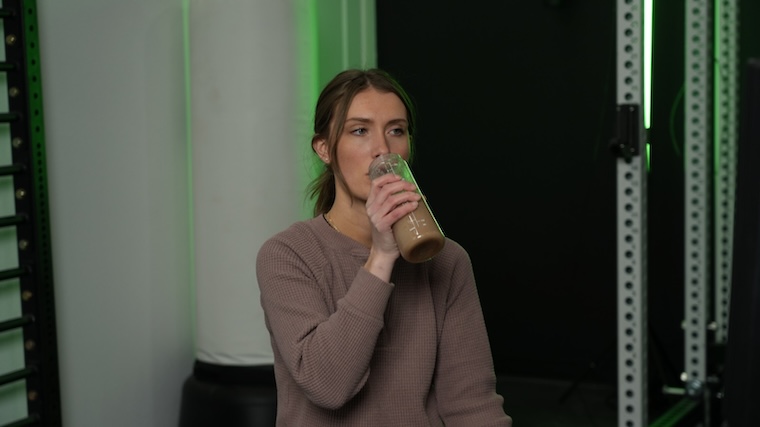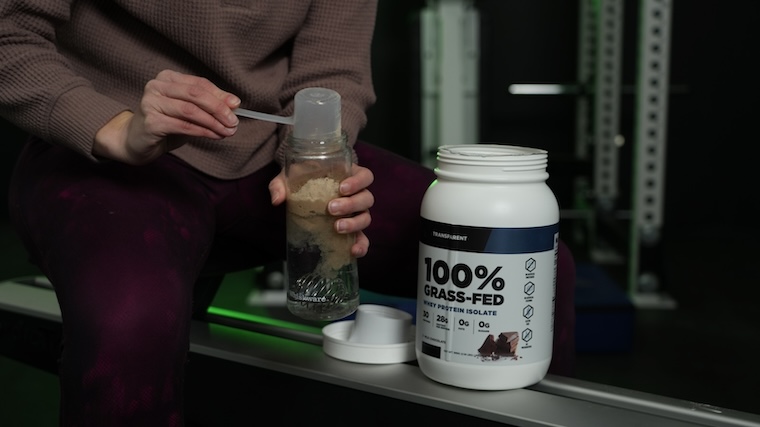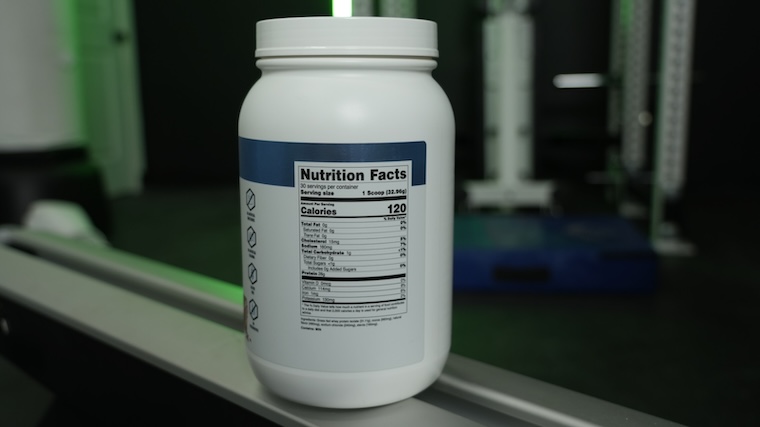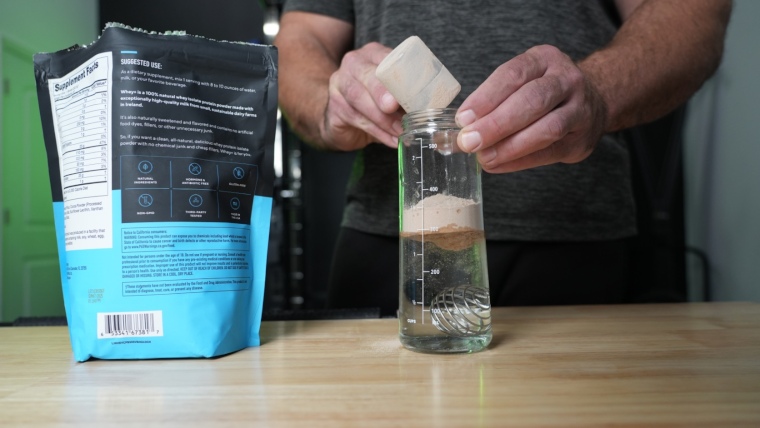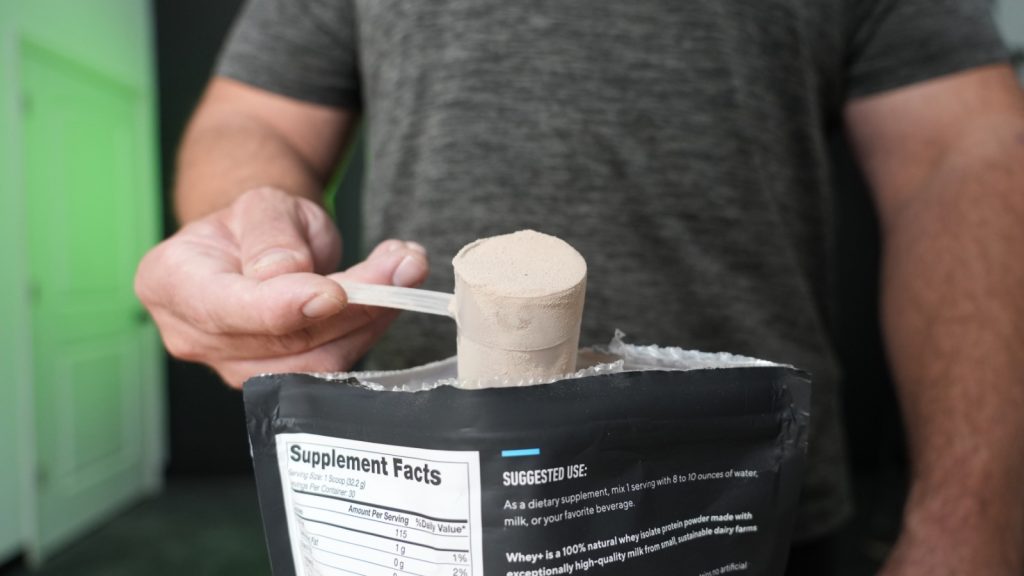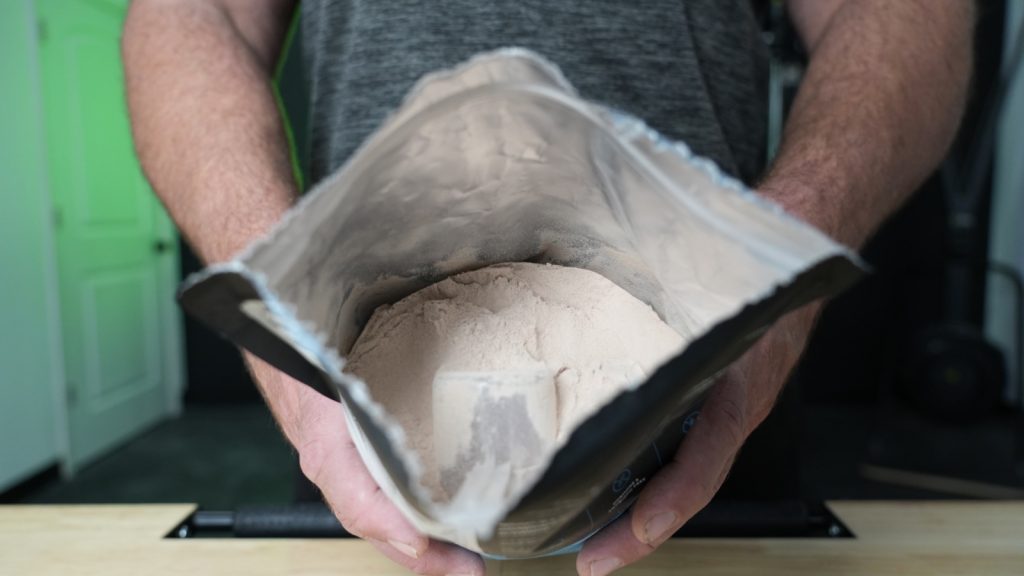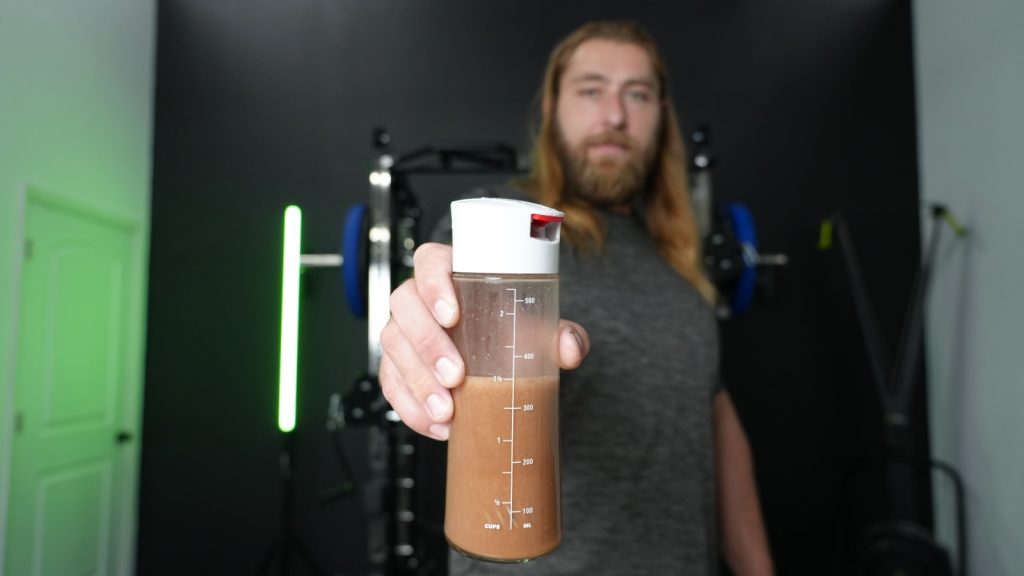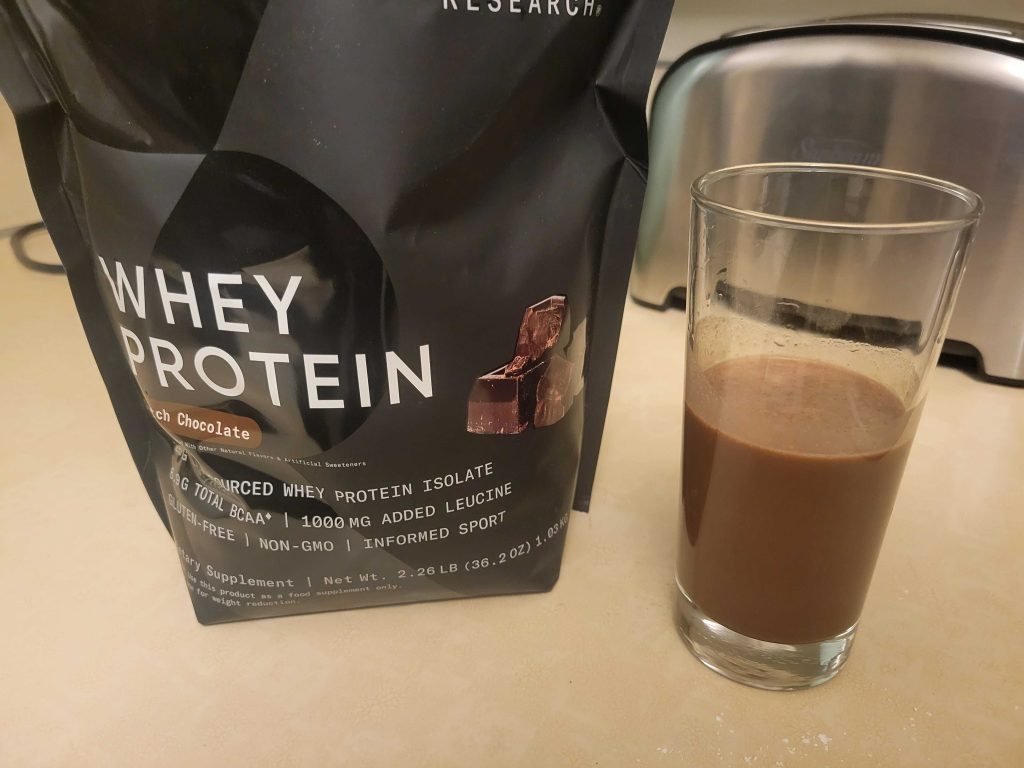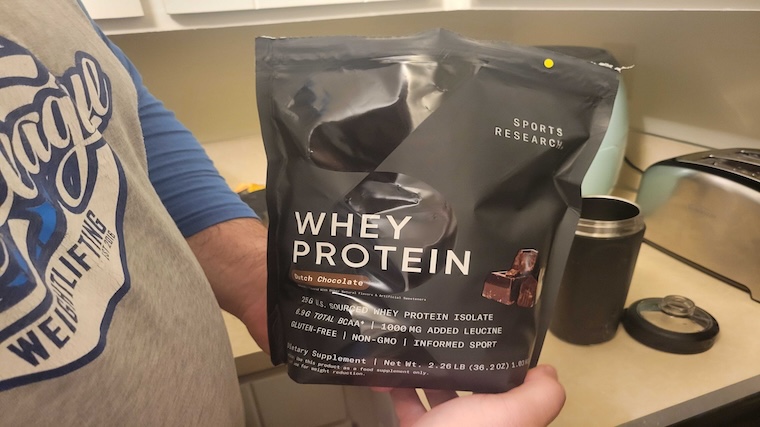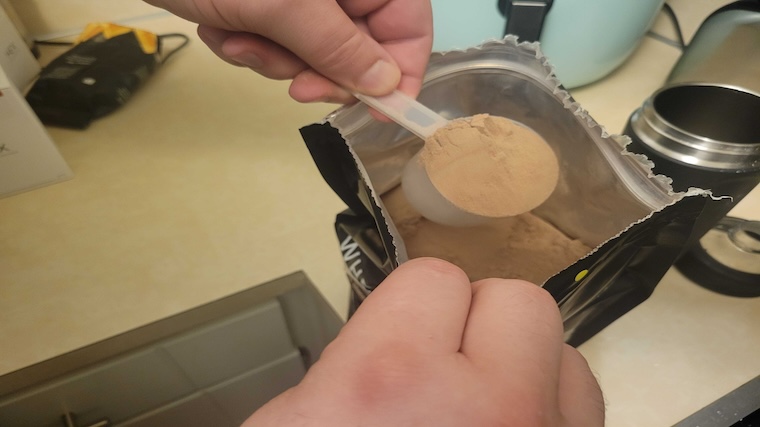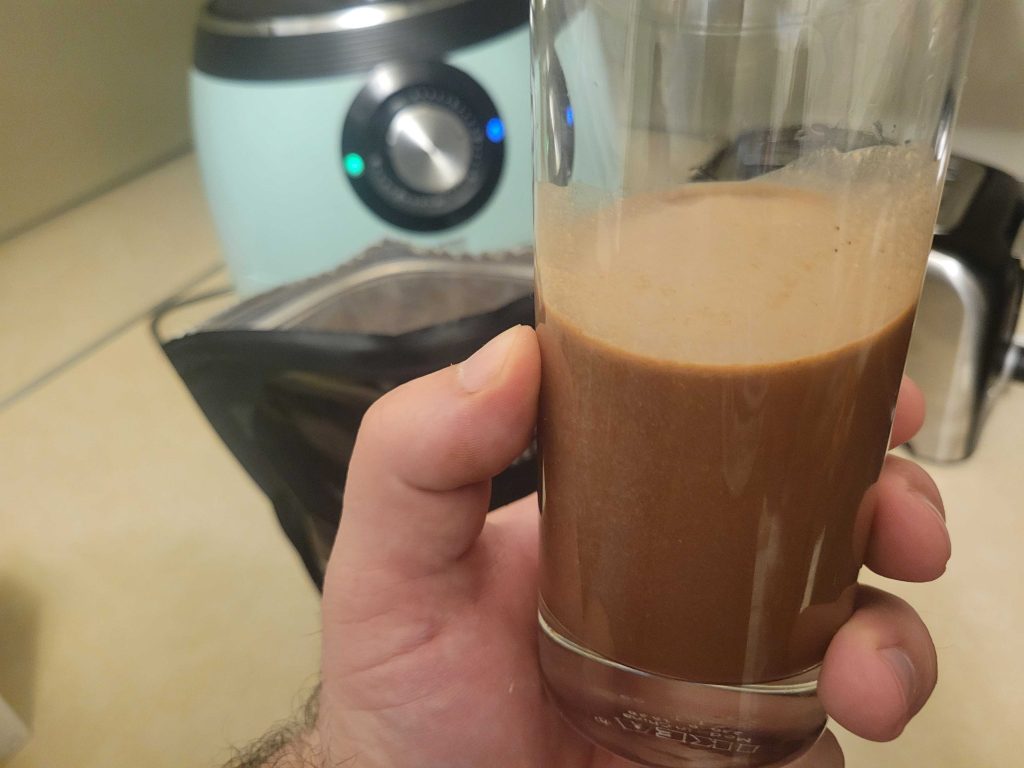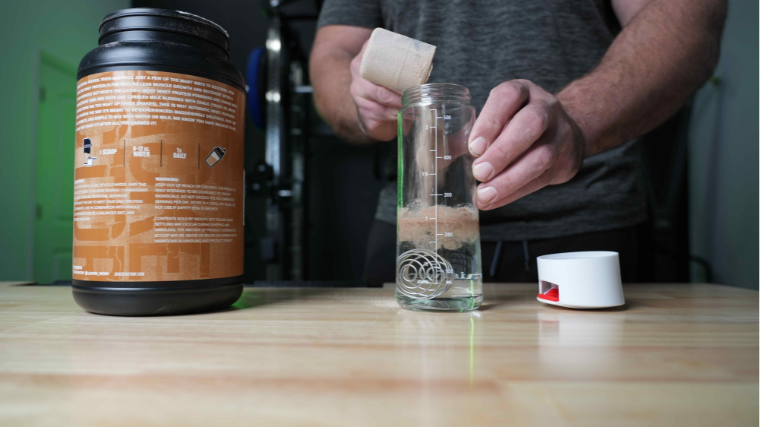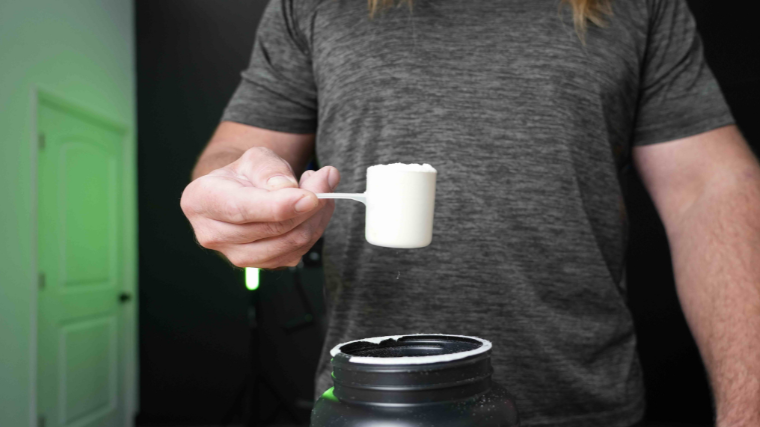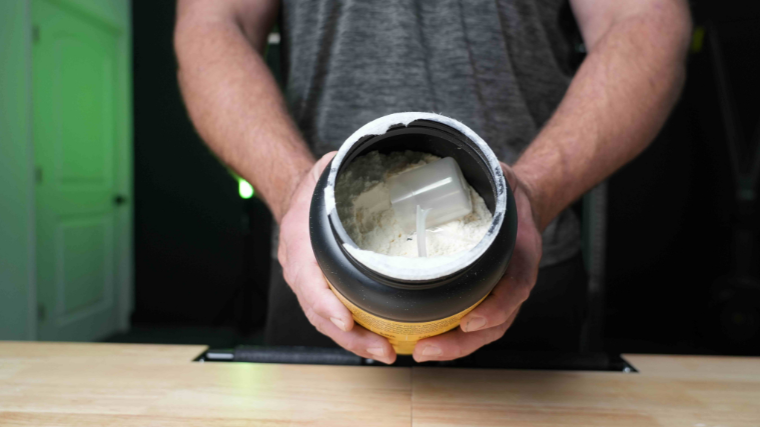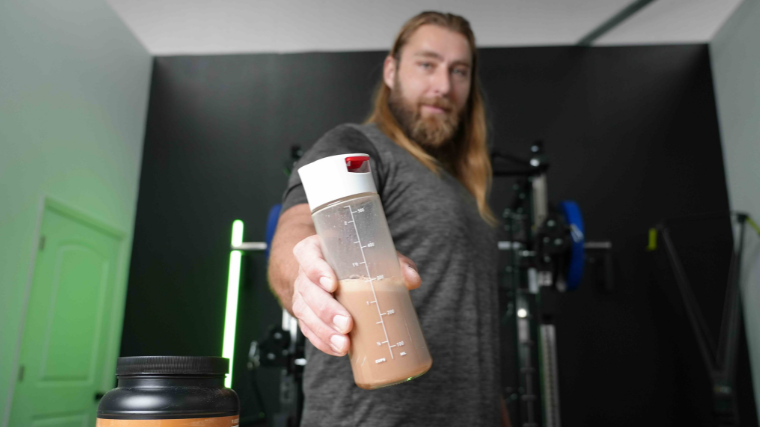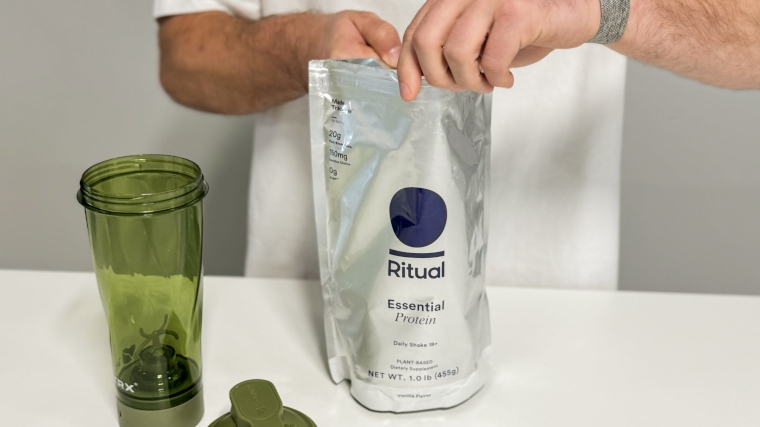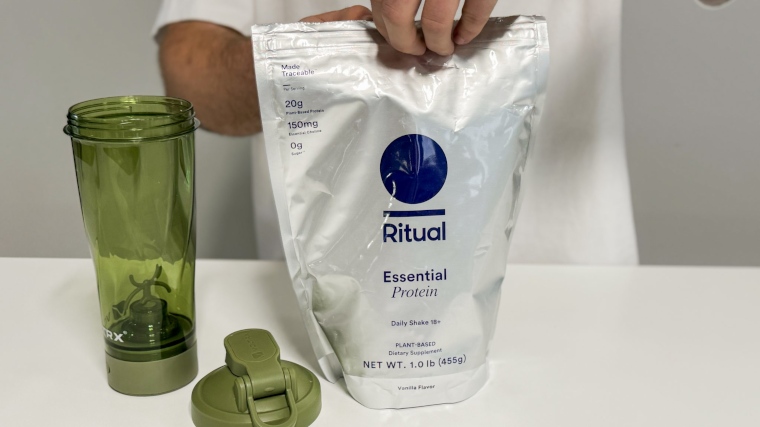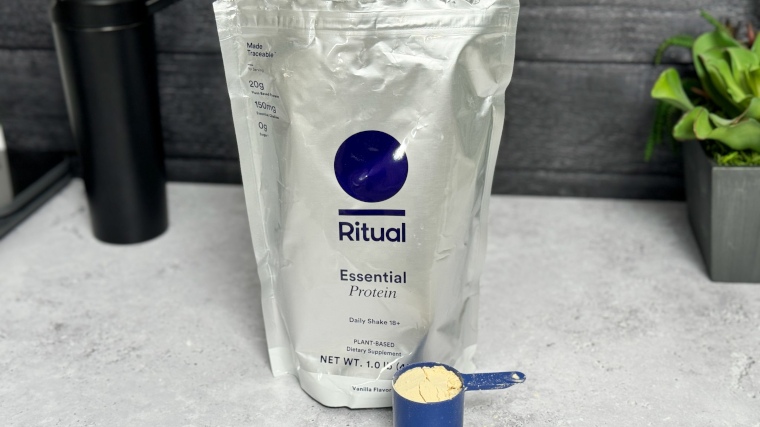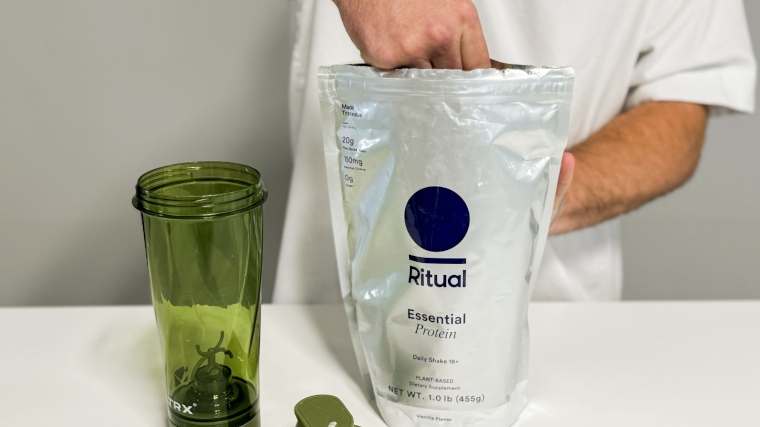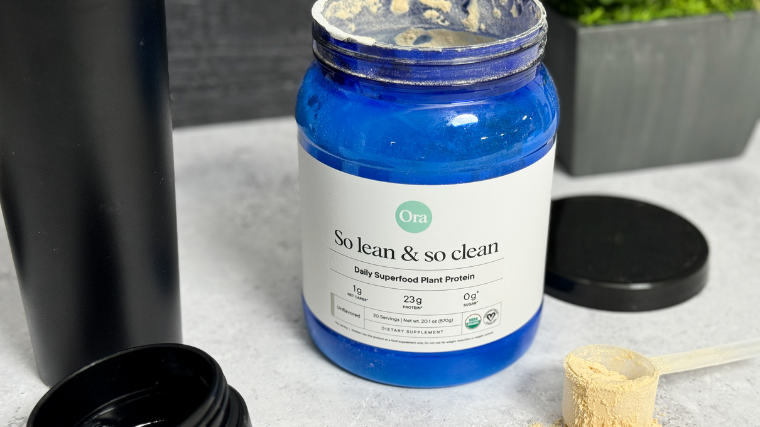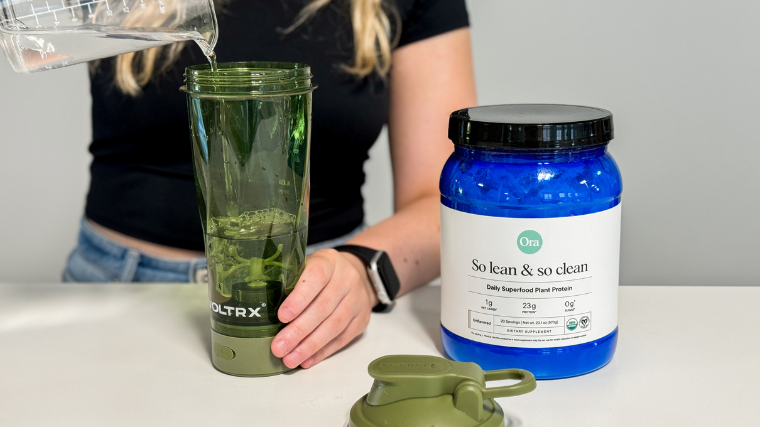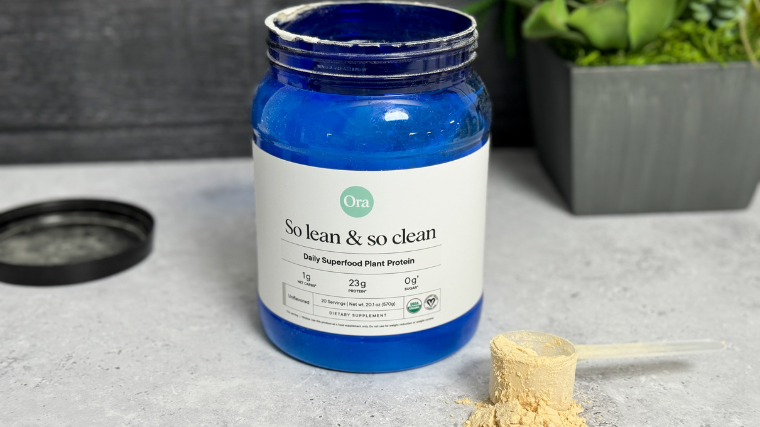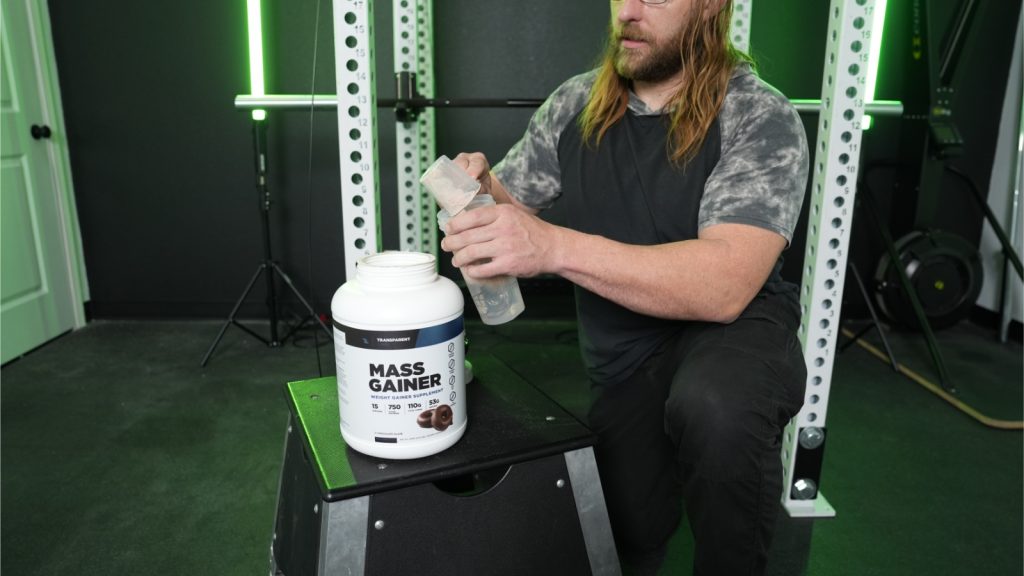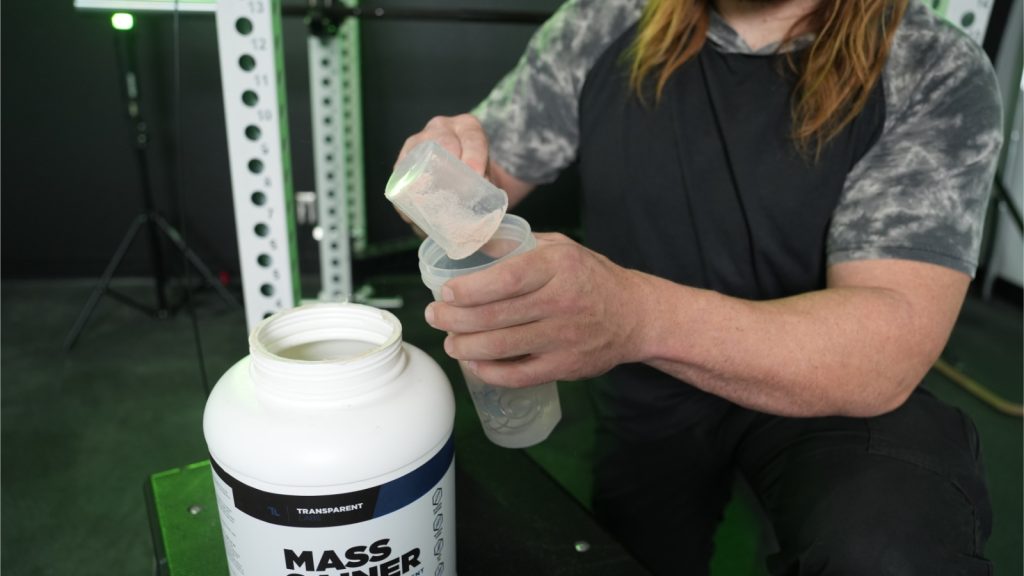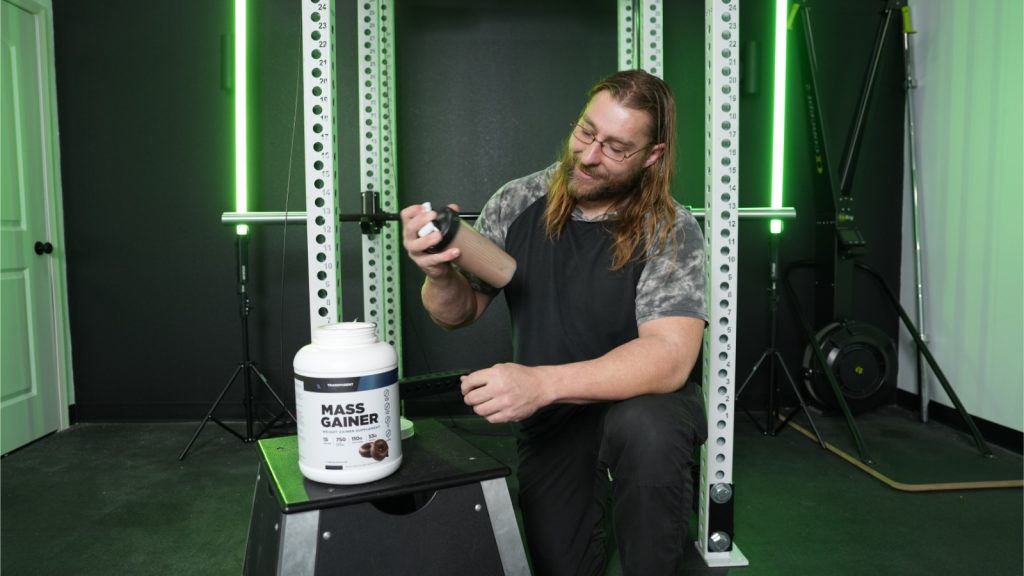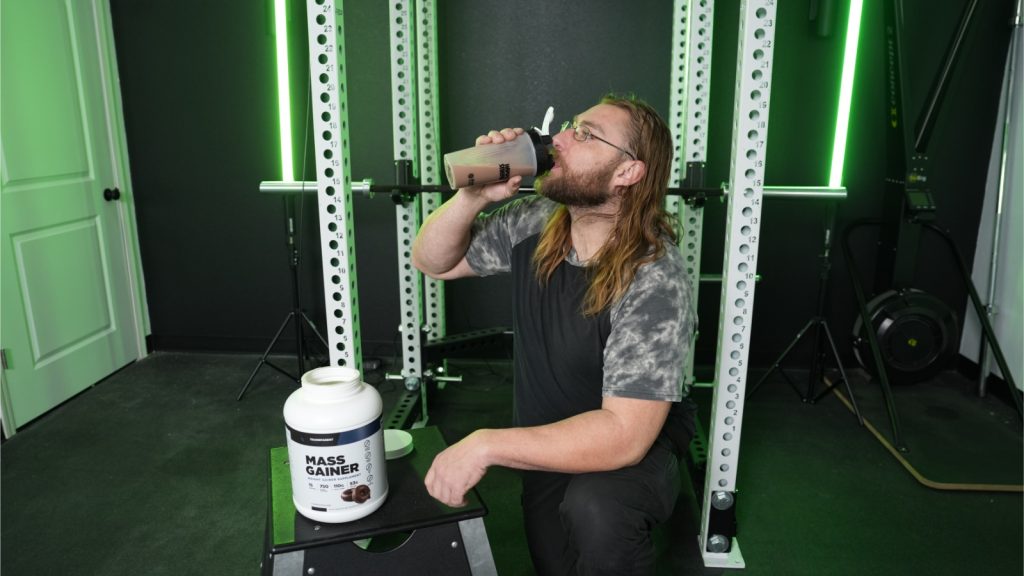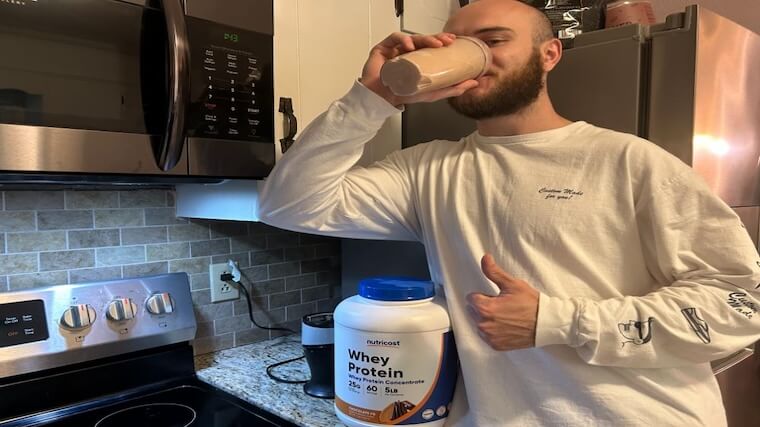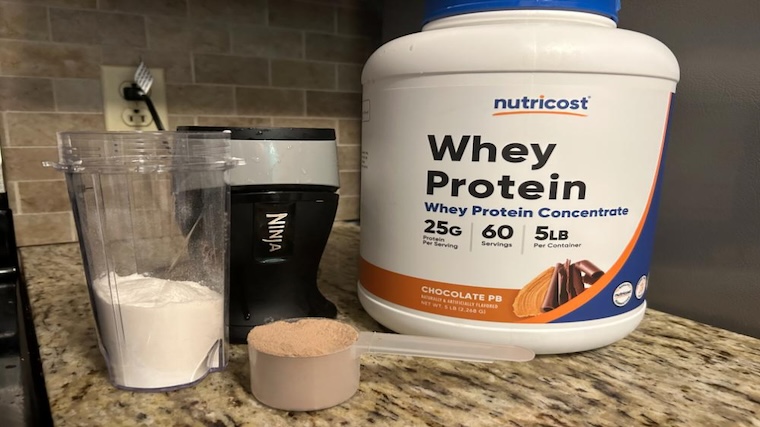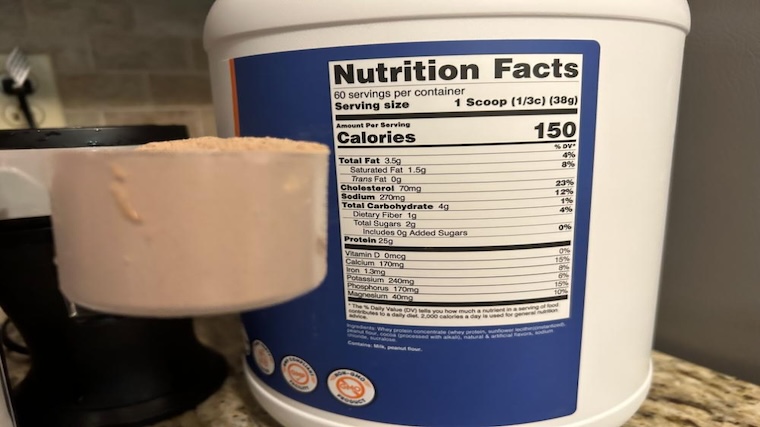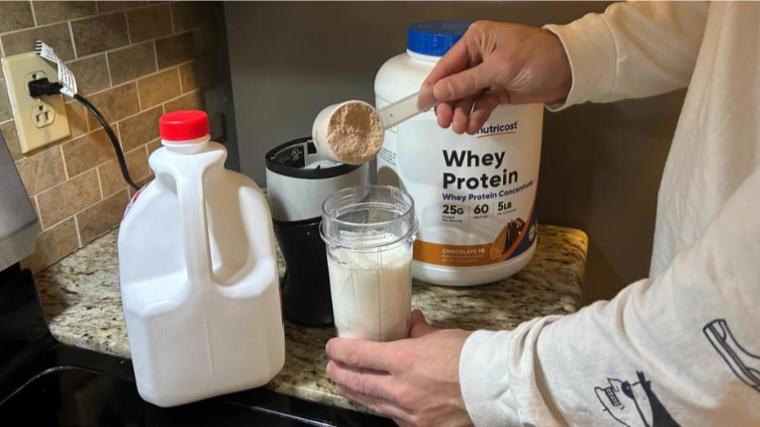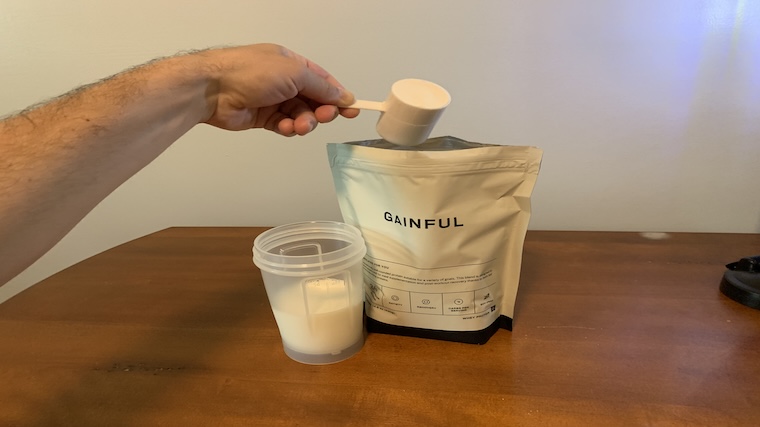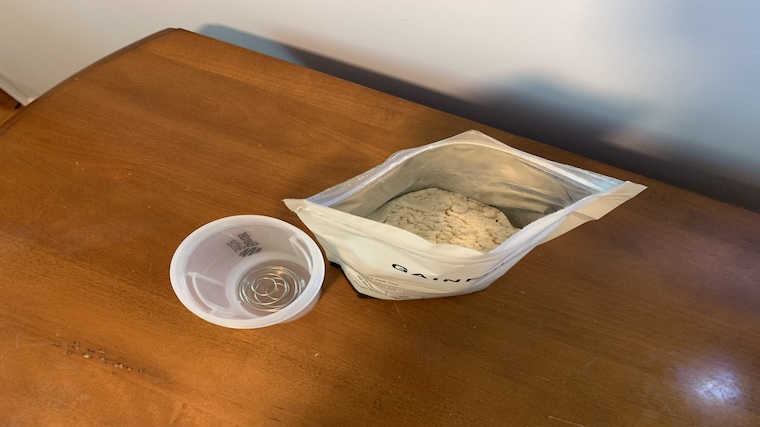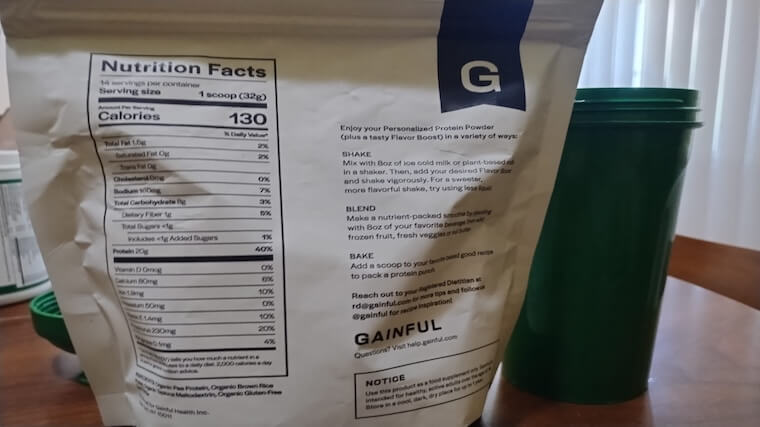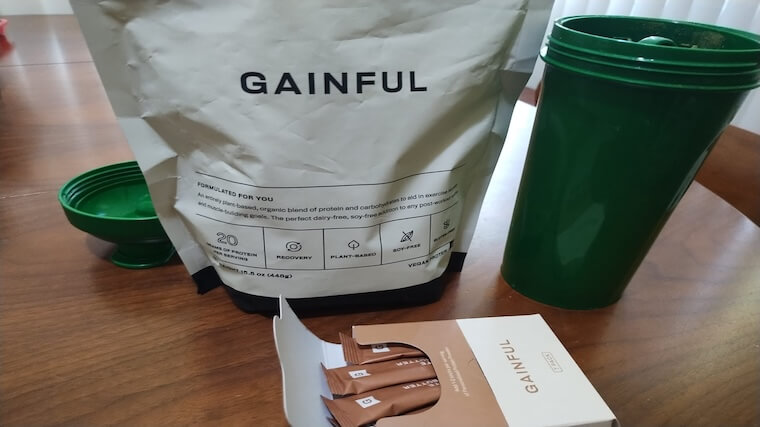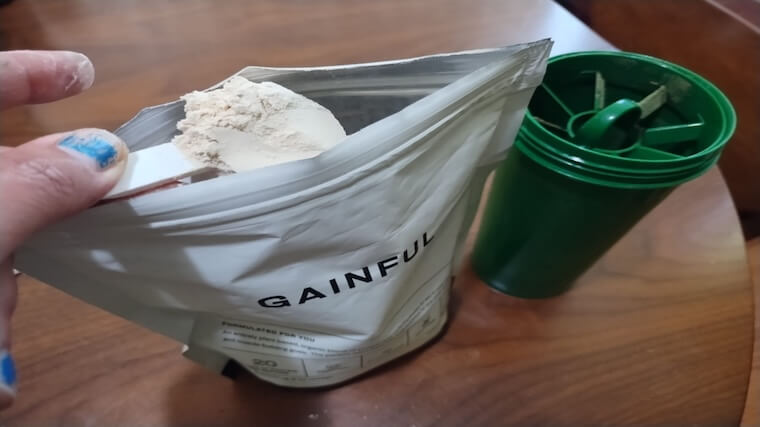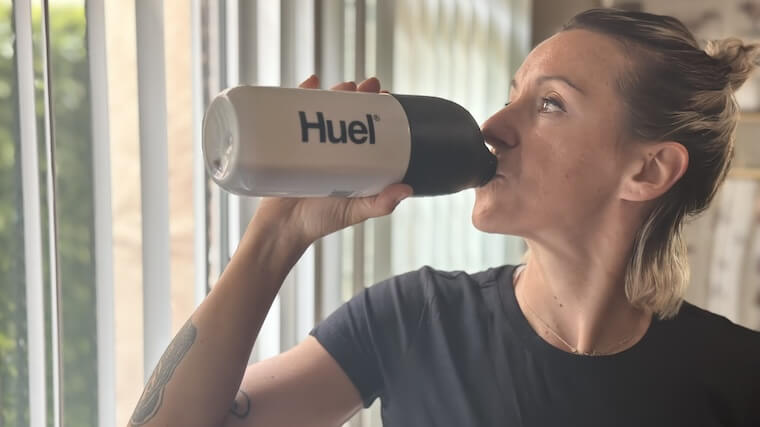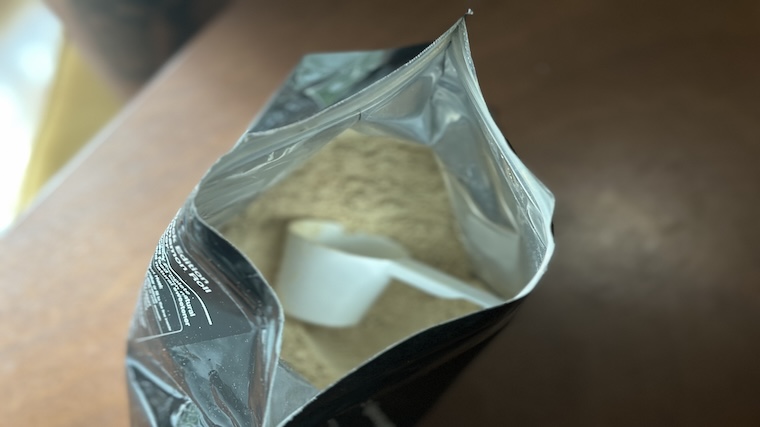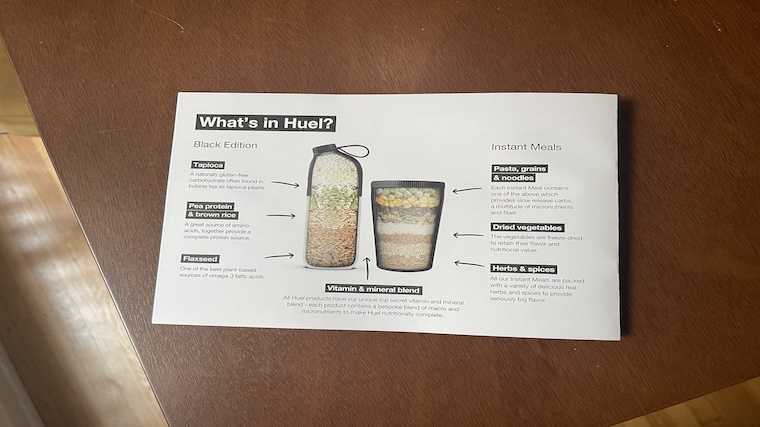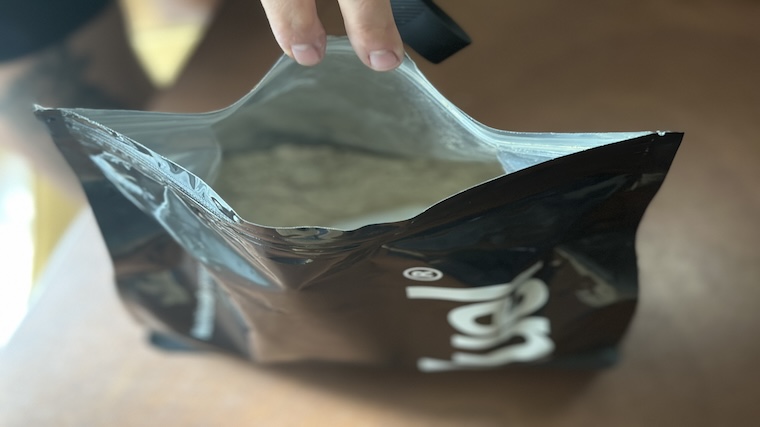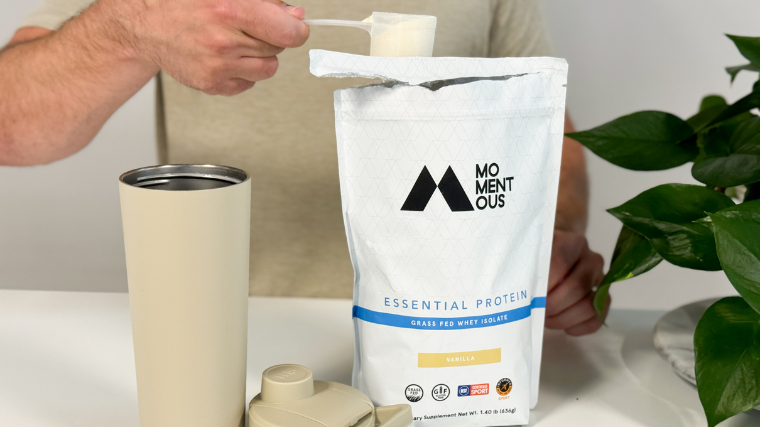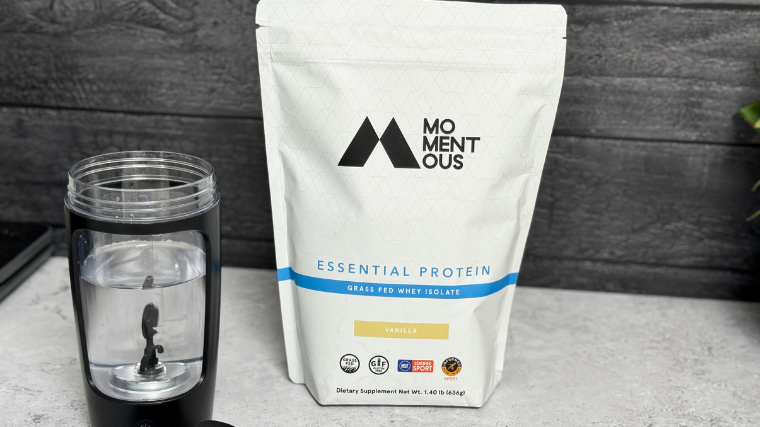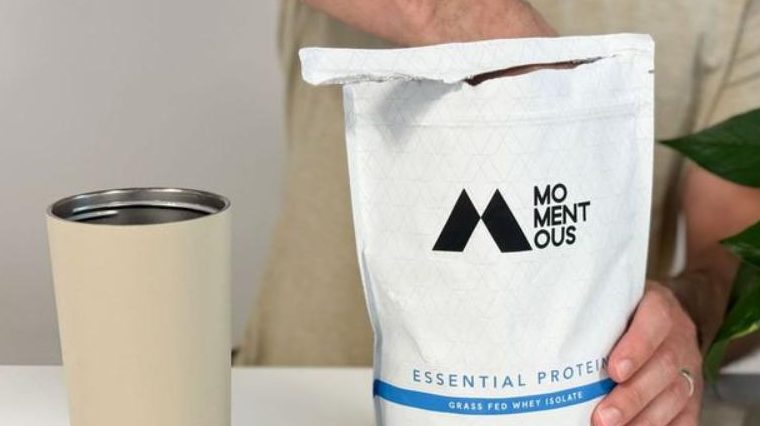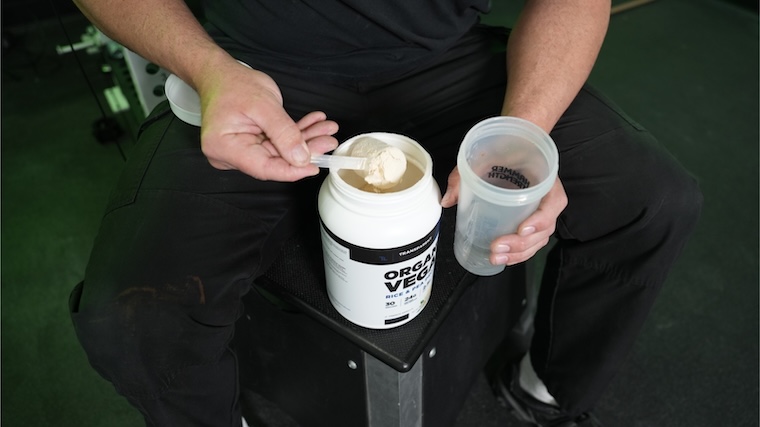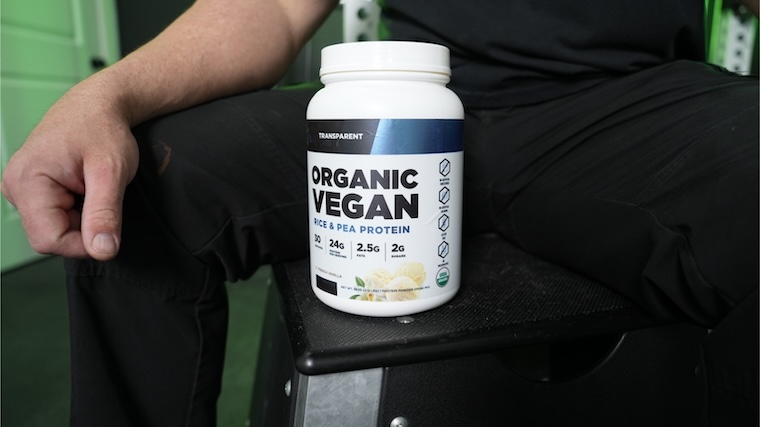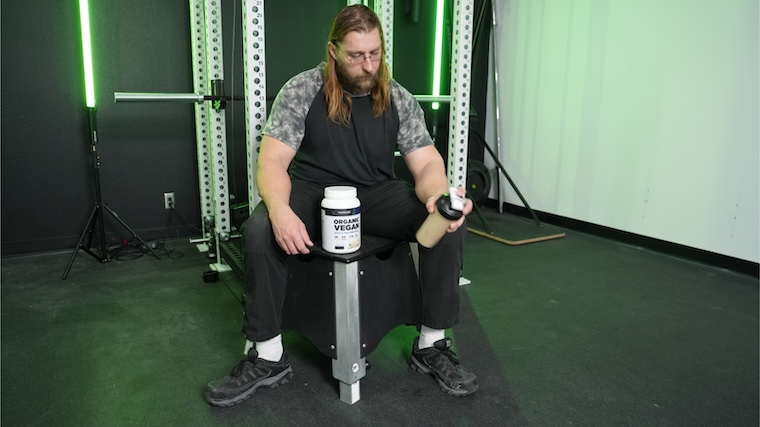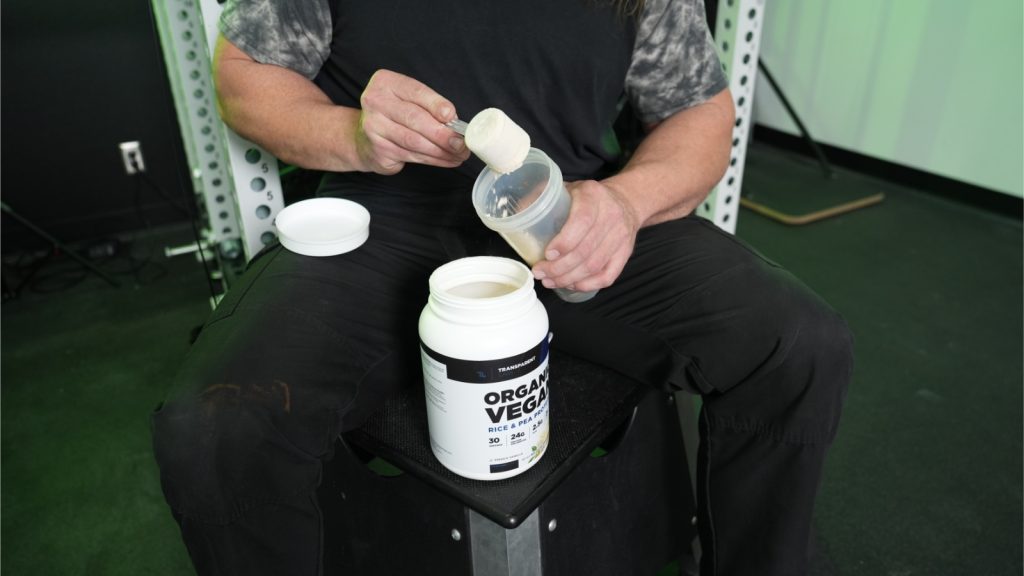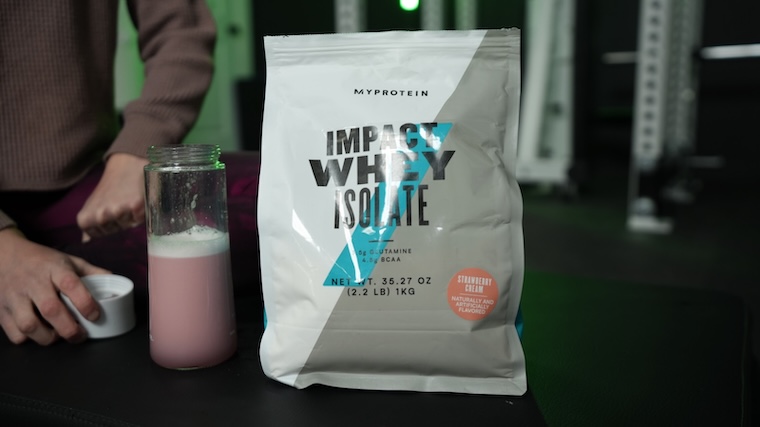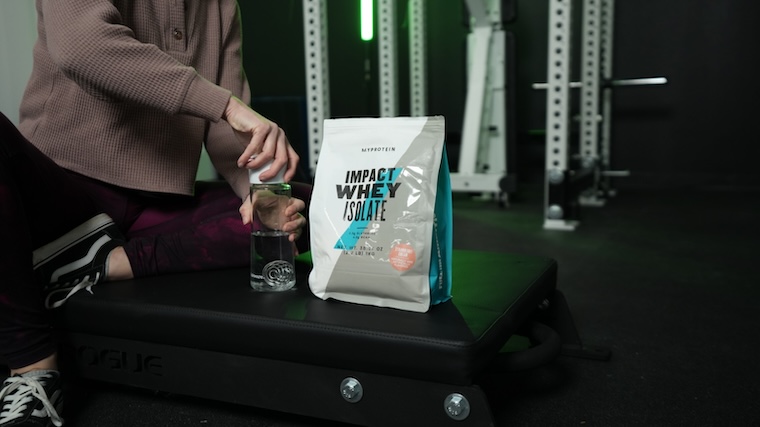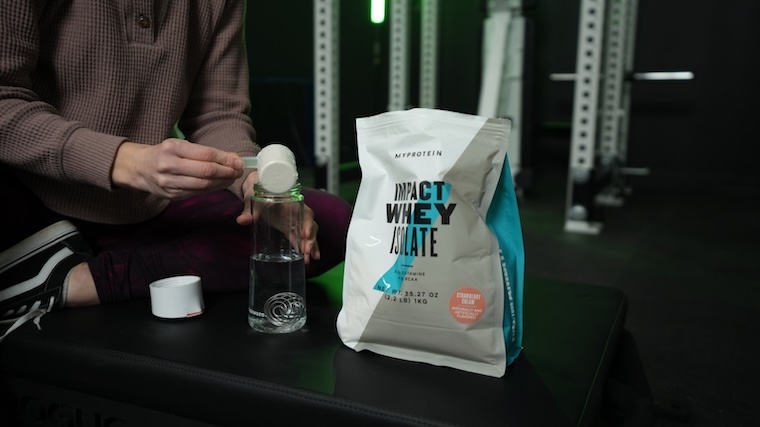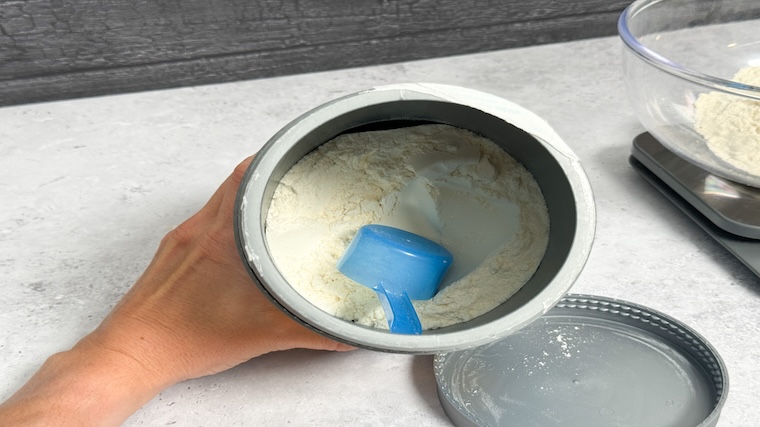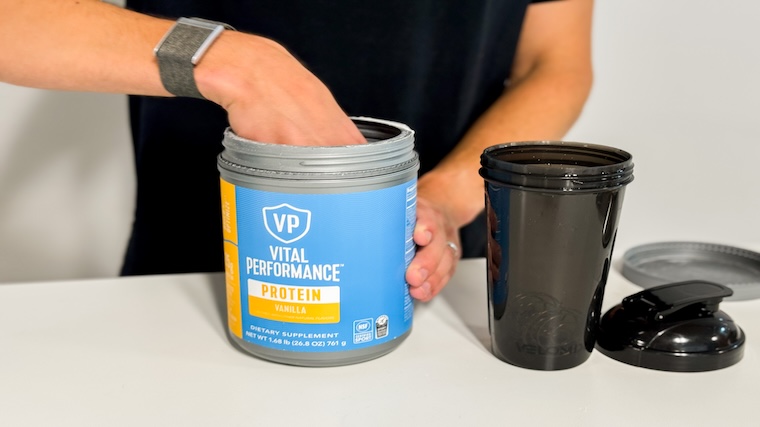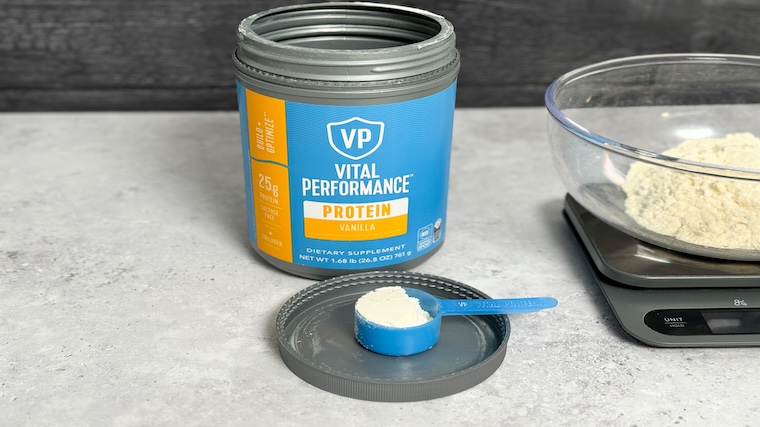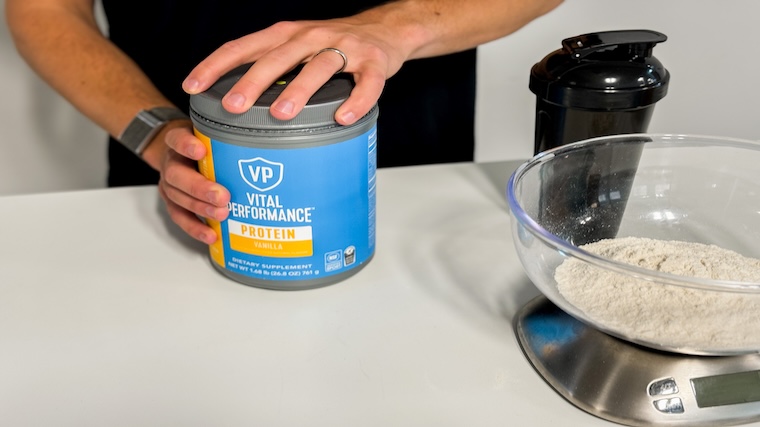According to Dr. Raj Dasgupta, MD, “The best protein powders may help all athletes when it comes to building muscle, managing weight, and staying healthy.” Like the best pre-workout supplements, these tasty and fitness-focused supplements can be excellent additions to your daily regimen. Finding a proper protein supplement for your specific goals and tastes, though, can be quite the challenge if you don’t know where to begin your search.
When looking for a protein powder for your nutritional routine, you’ll want to focus on its macronutrient profile to ensure you’re getting enough protein, carbs, and fat per serving. It can also be wise to seek out third-party tested supplements that are accurately labeled and free of banned substances. To help you make an educated purchase, we’ve tested over 100 different protein powders from top brands, using our supplement testing methodology to structure trials examining the following:
- Protein Content: How much protein can these powders deliver in each serving? Where is the protein sourced from?
- Taste and Available Flavors: Do the available flavors offer enough variety to support taste changes in the future? Is each sip an enjoyable treat or a strenuous ordeal?
- Solubility: Does the powder mix easily in a shaker bottle, or are you left with excessive residue?
- Third-Party Testing: Has the supplement been examined for banned substances?
The BarBend team has helped connect over 1.6 million athletes with high-quality dietary supplements to help fuel their performance and fitness progress. If you’re in need of a new protein powder to supplement your daily health, we’re confident that the following details can help place you on the right path.
The 17 Best Protein Powders of 2026
- Best Protein Powder Overall: Transparent Labs Whey Protein Isolate
- Best Protein Powder for Women: Legion Whey+
- Best Protein Powder for Athletes: Sports Research Whey Protein Powder
- Best Protein Powder for Men: Jacked Factory Authentic ISO
- Best Vanilla Protein Powder: Ritual Essential Shake Daily 18+
- Best Organic Protein Powder: Ora Organic Plant-Based Protein Powder
- Best Protein Powder for Weight Gain: Transparent Labs Mass Gainer
- Best Protein Powder for Muscle Gain: Nutricost Whey Protein Powder
- Best Vegan Protein Powder (Plant Based): Gainful Vegan Protein Powder
- Best Whey Protein Powder: Wellah Protein Your Whey
- Best Protein Powder for Weight Loss: Huel Black Edition
- Best Protein Powder for Smoothies: Momentous Whey Protein Isolate
- Best Pea Protein Powder: Transparent Labs Organic Vegan Protein Powder
- Best Unflavored Protein Powder: Bulk Supplements Whey Protein Isolate
- Best Tasting Protein Powder: MyProtein Impact Whey Isolate
- Best Collagen Protein Powder: Vital Proteins Vital Performance Protein
- Best Casein Protein Powder: Nutricost Casein Protein Powder
Medical disclaimer: The content on BarBend is meant to be informative in nature, but it should not be taken as medical advice. The opinions and articles on this site are not intended for the diagnosis, prevention, and/or treatment of health problems. It’s always a good idea to talk to your doctor or nutritionist before beginning a new fitness, nutritional, and/or supplement routine.
Best Protein Powders Video Review
Join BarBend tester Jake Herod, NASM-CNC, and registered dietitian nutritionist Chelsea Rae Bourgeois, as they unpack some of our favorite protein powders from Legion, Xwerks, Momentous, and more.
The Best Protein Powder Overall: Transparent Labs Whey Protein Isolate
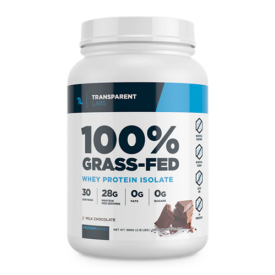
With 8 different flavors and 28 grams of whey protein from hormone-free, grass-fed cows, Transparent Labs Whey Protein Isolate is an excellent way to hit your protein macros.
Specs
- Protein Per Serving: 28g
- Flavors: Milk Chocolate, French Vanilla, Dark Chocolate, Chocolate Peanut Butter, Unflavored, Strawberry Milkshake, Vanilla Peanut Butter, Chocolate Chip Banana Bread, Mocha, Cinnamon French Toast, Oatmeal Chocolate Chip Cookie, Blueberry Pancakes, Mint Chocolate Chip, Chocolate Coconut
- Third-Party Testing: Informed Choice Certified, Informed Protein Certified
- Protein Source: Grass-fed whey isolate
- Price Per Serving: Starting at $1.82
Best Protein Powder for Women: Legion Whey+
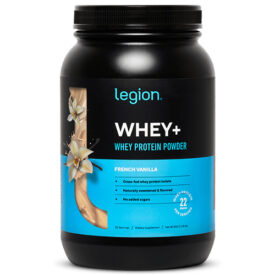
An all natural, non-GMO, fat-free whey that's cheaper than many competitors, Legion Whey Isolate Protein Powder is made from 100 percent grass-fed whey protein isolate from sustainable dairy farms in Ireland. It's also higher in calcium compared to other powders on the market.
Specs
- Protein Per Serving: Starting at 21g
- Flavors: Dutch Chocolate, French Vanilla, Cinnamon Cereal, Chocolate Peanut Butter, Salted Caramel, S’mores, Oatmeal Cream Pie, Peanut Butter Fudge, Coconut Cream, Cookies & Cream, Birthday Cake, Chocolate Hazelnut, Unflavored, Mint Chocolate, Banana Bread, Mocha Cappuccino, Strawberry Banana, Cocoa Cereal, Fruity Cereal, Pumpkin Pie, Apple Pie, Honey Cereal
- Third-Party Testing: Labdoor Tested for Purity
- Protein Source: Grass-fed whey protein
- Price Per Serving: Starting at $1.56
Best Protein Powder for Athletes: Sports Research Whey Protein Powder
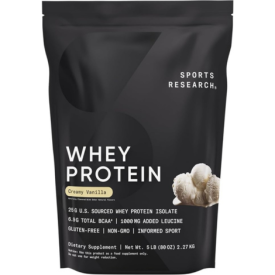
Offering 25 grams pf whey protein isolate alongside nearly 7 grams of BCAAs, Sports Research Whey Protein Isolate is a great option for those looking to supplement their diets, build muscle, and enhance workout recovery.
Specs
- Protein Per Serving: 25g
- Flavors: Chocolate, Creamy Vanilla, Dutch Chocolate
- Third-Party Testing: Informed Sport Certified
- Protein Source: Whey protein isolate
- Price Per Serving: Starting at $1.27
Best Protein Powder for Men: Jacked Factory Authentic ISO
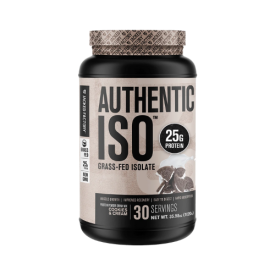
Dig into this easily digesting grass-fed whey isolate that provides 25 grams of protein with each lean 110 calorie scoop. It comes in three tasty flavors at a cost-effective price making it a solid choice for nearly anyone.
Specs
- Protein Per Serving: 25g
- Flavors: Chocolate Peanut Butter, Milk Chocolate, Cookies & Cream, Blueberry Muffin, Cinnamon French Toast, Unflavored, Vanilla Oatmeal Cookie, Vanilla, Peanut Butter
- Third-Party Testing: No
- Protein Source: Grass-fed whey protein isolate
- Price Per Serving: $1.33
Best Vanilla Protein Powder: Ritual Daily Essential Shake 18+
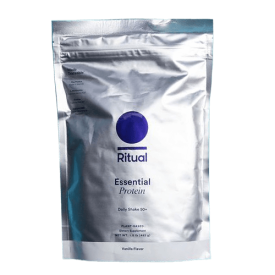
This clean, transparent protein powder relies on organic, non-GMO yellow peas for its 20-gram protein dosage. Additionally, the subscription-based model helps ensure you’re always stocked up to help you meet your nutritional goals day in and day out.
Specs
- Protein Per Serving: 20g
- Flavors: Vanilla
- Third-Party Testing: Informed Sport Certified
- Protein Source: Organic pea protein
- Price Per Serving: $3.27
Best Organic Protein Powder: Ora Organic Plant-Based Protein Powder
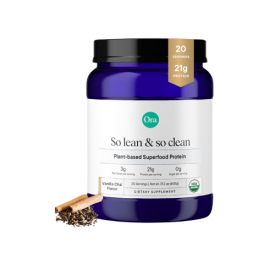
At 21 grams of plant-based protein per serving, Ora Organic offers a blend of pea and rice protein to help you hit your intake goals. Available in Vanilla Chai, Chocolate, Vanilla, or Unflavored, there's a dessert-esque protein option for a range of palates.
Specs
- Protein Per Serving: Up to 23g
- Flavors: Chocolate, Unflavored, Vanilla, Vanilla Chai
- Third-Party Testing: Certified Vegan, USDA Organic
- Protein Source: Rice and peas
- Price Per Serving: $2.50
Best Protein Powder for Weight Gain: Transparent Labs Mass Gainer
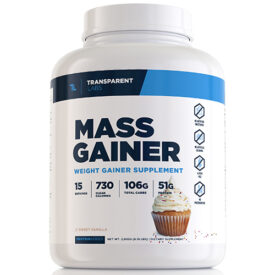
With nothing artificial, whey from New Zealand, a good amount of fiber, and little sugar, this mass gainer will satisfy most athletes. It's a clean mass gainer that focuses on simplicity over added bells and whistles.
Specs
- Protein Per Serving: Up to 53 grams
- Flavors: Chocolate Glaze Donut, Sweet Vanilla
- Third-Party Testing: Informed Choice Certified
- Protein Source: Grass-fed whey protein concentrate
- Price Per Serving: $5.33
Best Protein Powder for Muscle Gain: Nutricost Whey Protein Powder
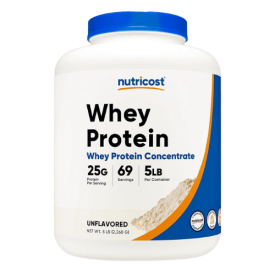
Need a protein powder that’s light on cost yet heavy on flavor? Available in four traditional tastes — Chocolate Peanut Butter, Chocolate, Strawberry Milkshake, and Vanilla — this Nutricost offering is available for less than $1 per serving, which can be ideal for athletes looking to build a well-rounded supplement regimen on a budget.
Specs
- Protein Per Serving: 25g
- Flavors: Vanilla, Milk Chocolate, Unflavored, Chocolate Peanut Butter, Strawberry Milkshake, Pineapple Whip
- Third-Party Testing: Yes
- Protein Source: Grass-fed whey protein concentrate
- Price Per Serving: Starting at $0.87
Best Vegan Protein Powder (Plant Based): Gainful Vegan Protein Powder
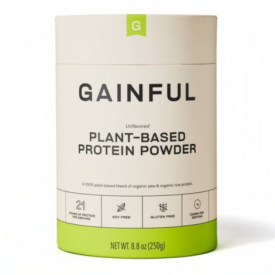
Gainful Plant-Based Protein Powder offers up to 24 grams of organic brown rice and pea protein, which delivers a complete amino acid profile. Right now, take 50% off your first order with the code: BF50.
Specs
- Protein Per Serving: 26g
- Flavors: Caffè Mocha, Madagascar Vanilla, Rich Cocoa, Strawberry Cream, Cookies & Cream, Chocolate Peanut Butter
- Third-Party Testing: No
- Protein Source: Organic brown rice and organic peas
- Price Per Serving: $3.50
Best Whey Protein Powder: Wellah Protein Your Whey
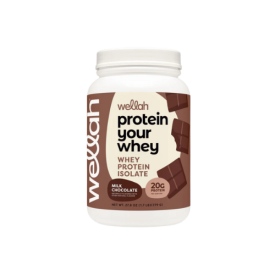
Coming in at 20 grams of whey protein isolate per serving, Wellah Protein Your Whey offers Milk Chocolate, Dark Chocolate, Vanilla, and Coconut flavors. Each flavor is sweetened with stevia.
Specs
- Protein Per Serving: 20g
- Flavors: Milk Chocolate, Coconut, Dark Chocolate, Vanilla
- Third-Party Testing: No
- Protein Source: Whey protein isolate
- Price Per Serving: $1.17
Best Protein Powder for Weight Loss: Huel Black Edition
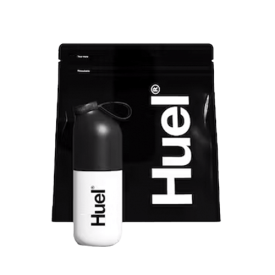
Huel Black Edition is a completely plant-based meal replacement that's loaded with vitamins and minerals. You can also choose from a wide variety of flavor options.
Specs
- Protein Per Serving: 40g
- Flavors: Chocolate, Vanilla, Banana, Strawberry Shortcake, Coffee Caramel, Salted Caramel, Cookies & Cream, Cinnamon Roll, Unflavored & Unsweetened
- Third-Party Testing: No
- Protein Source: Organic pea protein
- Price Per Serving: $3.31
Best Protein Powder For Smoothies: Momentous Whey Protein Isolate
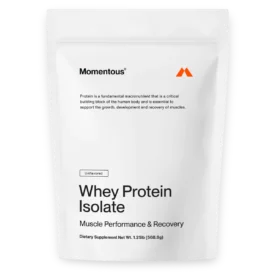
This whey isolate from Momentous offers 20 grams of protein with only 100 calories per serving. In addition to the protein, there's also 90mg of calcium and 115mg of potassium, as well as an enzyme blend to help aid digestion.
Specs
- Protein Per Serving: 20 grams
- Flavors: Chocolate, Unflavored, Vanilla
- Third-Party Testing: Informed Sport Certified, NSF Certified for Sport
- Protein Source: Grass-fed whey protein isolate
- Price Per Serving: $2.20
Best Pea Protein Powder: Transparent Labs Organic Vegan Protein Powder
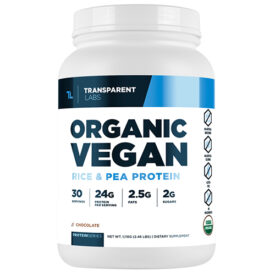
A surprisingly delicious vegan protein powder that's totally free from artificial ingredients and soy, Transparent Labs Organic Vegan Protein contains a 2:1 ratio of rice to pea protein powder, and 4 grams of fiber.
Specs
- Protein Per Serving: 24g
- Flavors: Chocolate, French Vanilla
- Third-Party Testing: Informed Protein Certified
- Protein Source: Rice and pea protein
- Price Per Serving: $1.67
Best Unflavored Protein Powder: Bulk Supplements Whey Protein Isolate
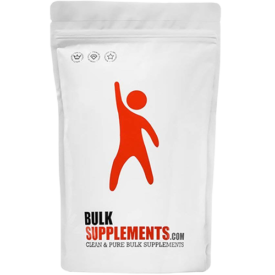
This product is clean and simple with 27 grams of whey protein isolate per serving and under one gram of carb and fat.
Specs
- Protein Per Serving: 26g
- Flavors: Unflavored
- Third-Party Testing: Yes (certifying lab not identified)
- Protein Source: Whey protein isolate
- Price Per Serving: Starting at $1.09
Best Tasting Protein Powder: MyProtein Impact Whey Isolate
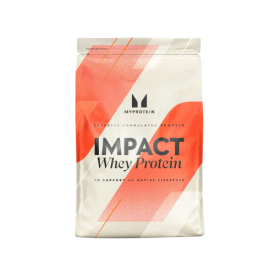
For athletes wanting a complete protein solution for post-workout needs, MyProtein Impact Whey Isolate can be just the ticket. A majority of the calories within this formulation are designed to help promote post-workout recovery, and the ingredients contain no added sugars or fat per dosage.
Specs
- Protein Per Serving: 25g
- Flavors: Chocolate Brownie, Chocolate Milkshake, Chocolate Mint, Cookies & Cream, Fruity Cereal, Mocha, Salted Caramel, Strawberry Milkshake, Unflavored, Vanilla Ice Cream
- Third-Party Testing: Informed Choice Certified, Informed Protein Certified
- Protein Source: Whey protein isolate
- Price Per Serving: Starting at $1.69
Best Collagen Protein Powder: Vital Proteins Vital Performance Protein
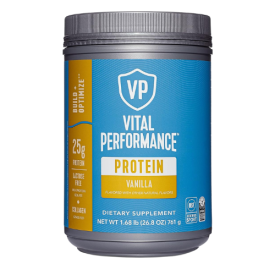
This impressive supplement from Vital Proteins combines milk protein isolate with bovine collagen peptides to create a unique formulation to help you meet your daily protein needs. This powder is available in your standard Chocolate, Vanilla, and Strawberry offerings in addition to Cold Brew Coffee for athletes wanting a more adventurous flavor profile.
Specs
- Protein Per Serving: 25g
- Flavors: Chocolate, Vanilla, Strawberry, Cold Brew Coffee
- Third-Party Testing: NSF-Certified for Sport, Informed Sport Certified
- Protein Source: Milk protein isolate, bovine collagen peptides
- Price Per Serving: $1.43
Best Casein Protein Powder: Nutricost Casein Protein Powder
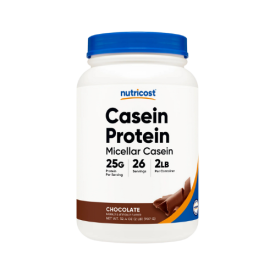
As a budget-friendly casein option, Nutricost Casein Protein Powder comes in three flavor options with costs starting below $1 per serving. This easy-to-mix powder also creates a smooth, enjoyable consistency when mixed that can be perfect for taking advantage of casein’s slow-digesting qualities post-workout.
Specs
- Protein Per Serving: 24-25g
- Flavors: Chocolate, Vanilla, Unflavored
- Third-Party Testing: Yes (certifying lab not identified)
- Protein Source: Micellar casein
- Price Per Serving: Starting at $0.88
How We Tested and Chose the Best Protein Powders
Reading ingredient labels online can give you a good idea of what to expect from a protein powder. But you can’t really put a product to the test without sipping it yourself. To save you from buying and returning any supplements, we took the testing in our own hands, trying more than 100 different protein supplements. We scored each product on a scale of 1 (woof) to 5 (yeah!) in categories like taste, solubility, and side effects. See some of the other considerations that went into our picks below.
- Flavor: Although flavor isn’t the most important factor when you’re on the hunt for a new protein, it’s worth considering. We also know that flavor is pretty subjective, so we tried to test as many flavor varieties as possible.
- Protein Content: We prioritized products that offered at least about 20 grams of protein per serving. Of course, that’s a little more difficult to achieve with plant-based proteins but nevertheless, we still picked the best options for all respective categories.
- Solubility: Most athletes drink their protein powder with water in a shaker cup, which is exactly how we tested each product. If a powder doesn’t dissolve in water with a blender ball, we made sure to keep it off our list. After all, who wants clumps in their protein? We also tested different prep methods, too. Some of our testers blended the supplements, mixed them with milk, and added them to foods.
- Texture: While we know texture is a personal preference — some athletes like thicker protein, whereas others prefer a thinner drink. We tried to describe the texture of each supplement as best as possible.
- Third-Party Testing: Unfortunately, the FDA doesn’t regulate supplements, like protein powder, in the same way it monitors other foods and drugs. That’s why we prioritized products that have been third-party tested for contaminants, heavy metals, antibiotics, pesticides, and mycotoxins. Our team also worked with a third-party accredited lab to conduct some testing of our own. We tested products on this page to assess their heavy metal content, along with other potentially-harmful contaminants.
- Price: Protein is a pretty popular supplement, so you shouldn’t need to pay a ton of money to have it in your supplement cabinet. That being said, we know some products are more expensive than others. We tried to provide a list of products that can suit readers of all budgets.
- Lab Testing: We worked with a third-party accredited lab to rate and score a handful of picks, analyzing each product’s purity and label accuracy.
Protein Powder Benefits
Sometimes it can be difficult to eat enough protein throughout the day though, which is where supplements come in.
- Promotes Recovery: A diet rich in high-protein foods may have safe, positive effects on your body weight and body composition (increased lean muscle mass and decreased fat mass). (1) High-protein diets may also help improve muscle recovery after a tough training session. (2)
- Convenience: Protein powders provide a large dose of protein in protein shake form (when mixed with water, or dairy, or another liquid source) that you can sip in your car or at the gym.
- Versatility: While you can sip protein powder right out of a shaker bottle with some water, you can mix it into your favorite foods, too, to add some protein.
- Helps Build Muscle: In addition to better recovery, protein powders can be vital for those aiming to build muscle. (1) The delivered amino acids in each serving are vital to supporting muscle repair and growth over time.
- Can Support Weight Loss: Protein powders can also be helpful during weight loss journeys as a means to maintain macronutrient counts during a calorie deficit. However, the calories from your protein shake should be accounted for in your daily consumption in order to not ingest more than required of your weight loss goals.
How to Use Protein Powder
Like other powdered products like the best creatine supplements or pre-workouts, protein powder is intended to be mixed with your liquid of choice and blended into a shake for consumption. The amount of liquid required for a serving can depend on your brand’s specific instructions, so it’s always important to read any listed instructions before trying to concoct a beverage before or after training.
How Much Protein Powder Should I Take?
A majority of powders come with 20 grams of protein or more per serving, but the main metric to consider when calculating how much protein to take is your daily protein requirement. The recommended daily allowance for protein is roughly 0.8 grams per kilogram of bodyweight. (21) This daily protein count also includes your intake from whole-food sources throughout the day, so it’s important to look for a protein powder that compliments your dietary habits in an effort to help you achieve your goals.
When Should You Take Protein Powder?
According to Catherine Kruppa, registered dietitian and BarBend expert contributor, “If your goal is muscle gain and recovery, the best time to drink your protein shake is within 30 to 60 minutes after you finish your workout. After a workout your body’s tank is empty, and it needs to be replenished with plenty of carbohydrates and protein.”
What to Consider Before Buying Protein Powder
Since there are so many options on the market, there are a lot of factors to consider before you buy and use even the healthiest protein powder. Different athletes are going to want different products, depending on their fitness goals. Here are a few factors to consider.
Your Training Goals
Ultimately, your fitness goals should influence which protein powder you choose. Are you interested in getting lean or do you want to put on some size? Consider your goals and look for a protein that can assist your efforts.
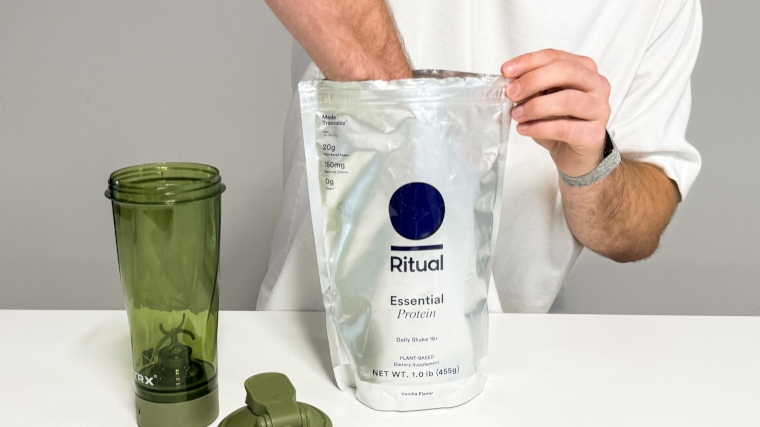
As Dr. Karen Shackelford, M.D., notes, “Resistance training combined with protein supplementation can promote muscle growth, also known as hypertrophy. These supplements may enhance muscle-building by boosting anabolic hormone production, including growth hormone, insulin-like growth factor (IGF-1), and testosterone. This leads to increased protein synthesis in muscles. Additionally, whey protein contains leucine, an amino acid that can directly trigger muscle protein synthesis.”
Protein Type
If you have a lactose intolerance, you want to consider the type of protein powder you purchase. While it may only be 2 or 3 grams, whey concentrate does contain more lactose than whey isolate protein and may not sit well in your stomach. Those sensitive to lactose may prefer to stick with whey isolates or lactose-free, vegetarian options, such as pea protein, a plant-based source of protein.
Protein Content
How much protein you’re getting per serving can be just as important as where the protein is sourced from. On average, you can expect around 25 grams of protein per serving from high-quality supplements with some outliers both below and above this mean metric. You’ll also need to think about your personal nutrition and whether the added macronutrients are warranted in relation to your whole foods diet. Crunch the numbers and look for a protein powder that helps you achieve your daily calorie and macro goals.
Soy Lecithin
The vast majority of protein powders contain a dash of soy lecithin because it can help to improve mixability. Concerns over soy raising estrogen levels or lowering testosterone levels have been floating around the strength training world for years, but studies show that most people’s hormone levels are unaffected by soy. (22)
Third-Party Testing
Unfortunately, the FDA doesn’t regulate supplements, like protein powder, in the same way it monitors other foods and drugs (more on that below). If you’re someone who desires peace of mind when it comes to a product’s purity, you’ll want to scour the nutrition labels for evidence of third-party testing.
Flavors
If you’re going to spend your hard-earned money on a product, it’s important that you actually enjoy the taste. Every individual has their subjective flavor preferences, so each person will like or dislike various flavors.
Ingredients
While most protein powders probably won’t have too many ingredients (outside of protein), you still want to take a close look at the nutrition label. Try to opt for a product that has as little artificial ingredients as possible. You should also pay attention to the calories, carbohydrates, and included fat in each serving, as these can be influential on your overall nutrition, too.
Price
The best protein powder for your training program is one that fits your budget best. From our calculations, the average price of high-quality protein powder hovers near $2 per serving, so this can be a good starting point for your shopping experience. However, some brands do offer multiple container sizes or “Subscribe & Save” services that can be helpful in dropping that price per serving to a more manageable number.
Calorie Content
Whey protein powders are generally pretty low-calorie, as the majority of the formula contains protein. Typically, you can expect one serving of whey to be somewhere around 110 to 130 calories — a nice, rounded number for putting into your best calorie calculator. However, calorie needs vary from one person to another. So if you’re looking to supplement with whey protein, consider your daily expenditure and consult a medical professional as needed.
Different Types of Protein Powder
The protein powders on this list are all derived from either whey or pea sources. But even from there, you can find subcategories of each different protein type. Here are a few differences you can expect:
| Whey Protein Isolate | Whey protein powders are made from milk but there are different ways it’s processed and filtered. Whey isolate undergoes a filtration process that helps remove as much lactose as possible, leaving a powder that’s lower in carbs and fat, focusing on protein. If you’re adamant about perfecting how you count your macros, this can be a simple addition to your nutrition plan with rounded numbers focusing on promoting protein consumption. Given the elevated processing, though, whey isolates can be more expensive than concentrates.Most whey protein isolate contains at least 90% protein. |
| Whey Protein Concentrate | Among the two types of whey protein, whey protein concentrate has a lower protein content. The actual protein percentage in concentrate varies based on the overall concentration of the batch. Less concentrated varieties typically contain around 30 percent protein or 18 grams per 100 calories. Whey concentrate does not undergo quite as much filtration. So, it’s generally a little higher in carbs and fats. This is a good pick for those who want to feel more satiated after sipping their protein. |
| Whey Protein Hydrolyzed | Hydrolyzed whey is whey isolate or concentrate that’s exposed to heat or enzymes in order to break down some of the amino bonds. In theory, this is supposed to make the whey easier to absorb. Hydrolyzed Whey is typically the most expensive form of whey, and yes, some studies have found it useful for athletes. Taking whey protein hydrolysates may improve performance and reduce markers of muscle damage. However, for the average person, it won’t make a practical difference. A caveat here is that hydrolyzed whey is so broken down that it’s usually the whey of choice for people with milk allergies. |
| Casein | This protein contains all the necessary amino acids for building muscle but it’s digested way slower than whey. |
| Plant-Based Protein | Plant-based proteins are blends that are made totally from plants with no animal products included. |
| Mass Gainers/Meal Replacement Shakes | Meal replacements and mass gainers are a protein powder variant designed with higher calorie counts than your typical protein supplement, either for the sake of replacing a whole meal or to help you consume more calories for weight gain. |
| Clear Whey Isolate | Clear whey isolate protein powder is far more refined than your standard whey isolate, resulting in nearly all of the protein’s lactose content being removed and an overall lighter profile that can be suitable for sensitive stomachs. Clear whey isolate is also often paired with fruitier flavors as an alternative to traditional tastes associated with lactose-containing whey isolate. |
| Egg Protein | As the name suggests, egg protein is sourced from eggs rather than cow’s milk or plants. Like casein, egg protein is slower digesting than other options, making it a good pick for all-day satiety and extended times between whole-food meals. |
What to Avoid in Protein Powder
While most protein powder formulations tend to have similar ingredients, they can vary quite a bit from brand to brand. Here’s what to avoid in protein powder:
Artificial Sweeteners
Artificial sweeteners can help create pleasing flavor profiles, but as BarBend expert contributor Aimee Gershberg states, “We do not have conclusive evidence to support any consensus on what these additives do for long term health outcomes such as in regard to the gut microbiome or weight management.”
Fillers
Fillers such as maltodextrin can be used in protein powders to increase the carbohydrate content. These highly-processed add-ons can potentially trigger allergies and may lead to gut disturbances.
Added Sugar
It’s always wise to look at the sugar content of your protein powder. Excessive sugar counts, especially with added sugars, can hike up your caloric intake and potentially lead to blood sugar spikes.
Personal Sensitivities
Of course, you should also listen to your body when choosing a proper protein supplement. If you’re sensitive to certain sweeteners like stevia or need to avoid gluten, read through the ingredients list to ensure those compounds are not present in your powder.
Protein Powder FAQs
What is protein powder?
In general, protein powder is a dietary supplement designed to help athletes improve their daily protein consumption in an easier method than constantly dining on whole-food sources. Protein can be sourced from both animals or plants, and can also include additives such as helpful micronutrients, vitamins, flavoring agents, sugars, and more.
Should I worry about consuming too much protein?
How much protein you should consume will depend on factors such as your body mass, training regimen, and current goals. If you go over those recommended numbers though, there is nothing to worry about. In the absence of any underlying condition, there is no evidence that there are any harmful health effects from consuming “too much protein.” However, it is always recommended to consult your physician if you have concerns regarding excessive protein intake.
Do protein powders expire?
Protein powders have a pretty long shelf life but they can expire after a certain period of time. Before you scoop from an old tub, make sure to double check the expiration date.
Should I take protein powder every day?
You can take protein powder every day, but determining whether you should is dependent on your overall fitness goals and other dietary habits. If you’re already consuming enough of the macronutrient through whole-food meals, then there is no need to consume protein powder on a regular basis. If you find that you’re failing to meet your daily protein requirements through whole foods, alone, then feel free to supplement your nutrition with a high-quality protein powder.
What type of protein is best for muscle gain?
Identifying the “best” protein type for muscle gain can be subjective, but we often recommend complete protein sources, or those featuring a full amino acid profile, for those embarking on muscle-building journeys. Complete proteins are often animal-based, but some plant-based proteins with multiple protein sources can be worthwhile, as well. In the end, the main goal is to find a protein powder that supports your daily protein goals as you eat and train your way to greater muscularity.
References
- Antonio, J., Candow, D. G., Forbes, S. C., Ormsbee, M. J., Saracino, P. G., & Roberts, J. (2020). Effects of dietary protein on body composition in exercising individuals. Nutrients, 12(6), 1890.
- Davies, R. W., Carson, B. P., & Jakeman, P. M. (2018). The effect of whey protein supplementation on the temporal recovery of muscle function following resistance training: A systematic review and meta-analysis. Nutrients, 10(2), 221.
- Wirth J, Hillesheim E, Brennan L. (2020). The Role of Protein Intake and its Timing on Body Composition and Muscle Function in Healthy Adults: A Systematic Review and Meta-Analysis of Randomized Controlled Trials. J Nutr., 150(6):1443-1460.
- Hannaian SJ, Orlando MN, Abou Sawan S, Mazzulla M, West DWD, Moore DR. (2020). Protein Timing Does Not Affect Next-Day Recovery of Strength or Power but May Enhance Aerobic Adaptations to Short-Term Variable Intensity Exercise Training in Recreationally Active Males: A Pilot Study. Front Sports Act Living, 2:568740.
- Kim J, Lee C, Lee J. (2017). Effect of timing of whey protein supplement on muscle damage markers after eccentric exercise. J Exerc Rehabil. 2017;13(4):436-440.
- Nunes EA, Colenso-Semple L, McKellar SR, et al. (2022). Systematic review and meta-analysis of protein intake to support muscle mass and function in healthy adults. J Cachexia Sarcopenia Muscle, 13(2):795-810.
- Pyne, D.B. et al. (2015). Probiotics supplementation for athletes – clinical and physiological effects. Eur J Sport Sci, 15(1):63-72.
- Hsu, Y.J. et al. (2015). Effect of intestinal microbiota on exercise performance in mice. J Strength Cond Res, 29(2):552-8.
- Jäger, R. et al. (2016). Probiotic Streptococcus thermophilus FP4 and Bifidobacterium breve BR03 Supplementation Attenuates Performance and Range-of-Motion Decrements Following Muscle Damaging Exercise. Nutrients, 8(10).
- Jäger, R. et al. (2016). Probiotic Bacillus coagulans GBI-30, 6086 reduces exercise-induced muscle damage and increases recovery. PeerJ, 4:e2276.
- Schmidt, K. et al. (2015). Prebiotic intake reduces the waking cortisol response and alters emotional bias in healthy volunteers. Psychopharmacology (Berl), 232(10):1793-801.
- Burke LM, et al. (2019). International Association of Athletics Federations Consensus Statement 2019: Nutrition for Athletics. Int J Sport Nutr Exerc Metab, 29(2):73-84.
- Longland TM, et al. (2016). Higher compared with lower dietary protein during an energy deficit combined with intense exercise promotes greater lean mass gain and fat mass loss: a randomized trial. Am J Clin Nutr. 103(3):738-46.
- Townsend JR, Morimune JE, Jones MD, et al. (2020). The Effect of ProHydrolase® on the Amino Acid and Intramuscular Anabolic Signaling Response to Resistance Exercise in Trained Males. Sports (Basel). 2020;8(2):13.
- Haider, LM, Schwingshackl, L, Hoffmann, G, Ekmekcioglu, C. (2018). The effect of vegetarian diets on iron status in adults: A systematic review and meta-analysis. Crit Rev Food Sci Nutr. 58(8):1359-1374.
- Min, J, Kim, SY, Shin, IS, Park, YB, Lim, YW. (2021). The Effect of Meal Replacement on Weight Loss According to Calorie-Restriction Type and Proportion of Energy Intake: A Systematic Review and Meta-Analysis of Randomized Controlled Trials. J Acad Nutr Diet, 121(8):1551-1564.e3.
- Babault, N, Païzis, C, Deley, G, Guérin-Deremaux, L, Saniez, MH, Lefranc-Millot, C, Allaert, FA. (2015). Pea proteins oral supplementation promotes muscle thickness gains during resistance training: a double-blind, randomized, Placebo-controlled clinical trial vs. Whey protein. J Int Soc Sports Nutr. 12(1):3.
- Banaszek, A, Townsend, JR, Bender, D, Vantrease, WC, Marshall, AC, Johnson, KD. (2019). The Effects of Whey vs. Pea Protein on Physical Adaptations Following 8-Weeks of High-Intensity Functional Training (HIFT): A Pilot Study. Sports (Basel), 4;7(1):12.
- Arroyo-Cerezo, A, Cerrillo, I, Ortega, Á, Fernández-Pachón, MS. (2021). Intake of branched chain amino acids favors post-exercise muscle recovery and may improve muscle function: optimal dosage regimens and consumption conditions. J Sports Med Phys Fitness, 61(11):1478-1489. doi: 10.23736/S0022-4707.21.11843-2.
- Campos, L. D., Santos Junior, V. de, Pimentel, J. D., Carregã, G. L., & Cazarin, C. B. (2023). Collagen supplementation in skin and orthopedic diseases: A review of the literature. Heliyon, 9(4). https://pubmed.ncbi.nlm.nih.gov/37064452/
- LeWine, H. E. (2023, June 22). How much protein do you need every day?. Harvard Health. https://www.health.harvard.edu/blog/how-much-protein-do-you-need-every-day-201506188096
- Kasti, A., Nikolaki, M., Synodinou, K., Katsas, K., Petsis, K., Lambrinou, S., Pyrousis, I., & Triantafyllou, K. (2022). The effects of stevia consumption on gut bacteria: Friend or foe? Microorganisms, 10(4), 744. https://www.ncbi.nlm.nih.gov/pmc/articles/PMC9028423/
